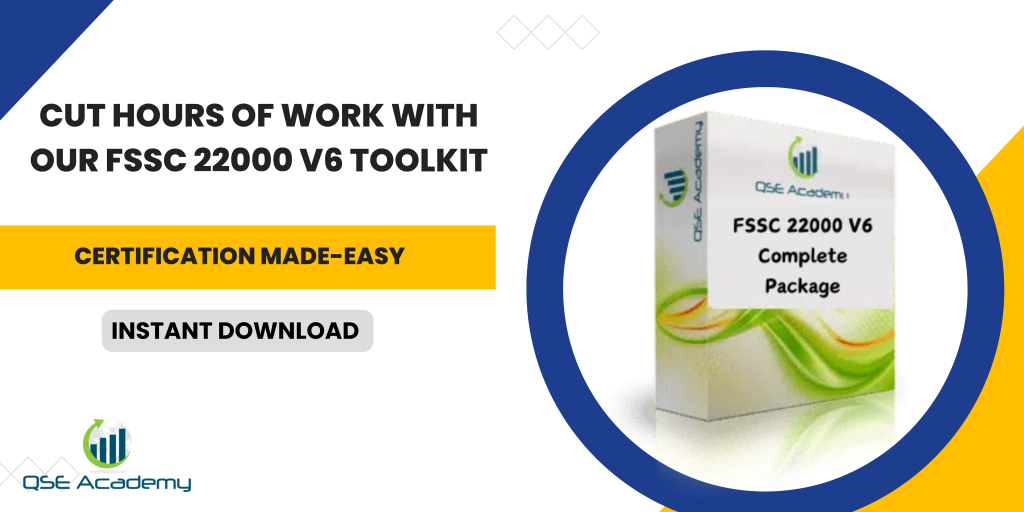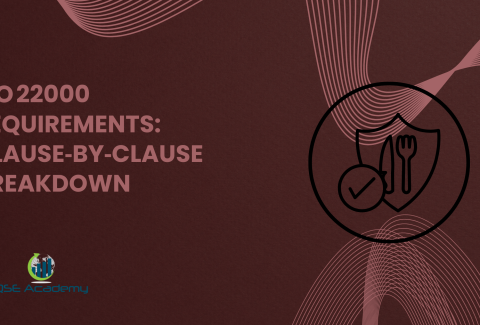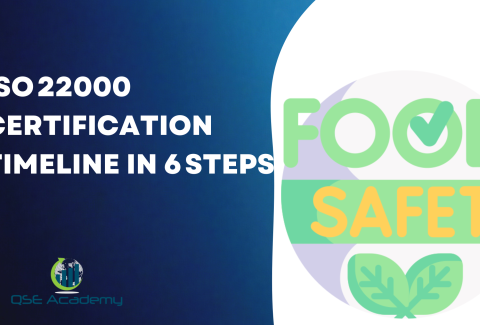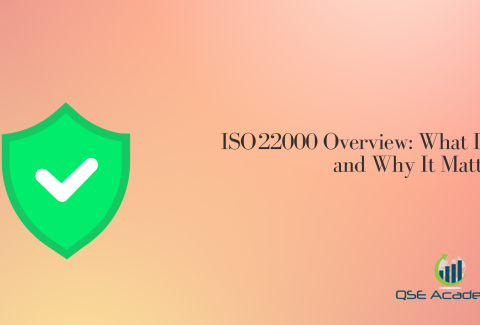Choosing a FSSC 22000 V6 Certification Body
Last Updated on December 23, 2025 by Hafsa J.
Why the Right Certification Body Matters
If you’re preparing for FSSC 22000 V6 certification, choosing the right certification body can make or break your project timeline.
I’ve seen this many times—two companies start at the same time, both equally prepared. The one that chose a responsive, accredited certification body gets certified first. The other spends weeks waiting for audit dates or feedback.
Your certification body isn’t just an auditor; it’s your long-term partner.
They’ll evaluate your system, verify compliance, and issue your certificate. So picking the right one means smoother audits, fewer delays, and credible recognition in the marketplace.
Let’s walk through how to choose a certification body that fits your organization perfectly.
Understanding What a Certification Body Really Does
Certification bodies—often called CBs—are independent organizations accredited to audit and certify against FSSC 22000 standards.
Their job is to confirm that your food-safety management system complies with ISO 22000:2018, FSSC Additional Requirements, and applicable ISO/TS 22002 PRP standards.
Here’s what they do for you:
- Conduct Stage 1 and Stage 2 audits.
- Evaluate corrective actions.
- Issue and maintain your certificate.
- Perform annual surveillance audits and recertification every three years.
- Keep you updated when the scheme changes (like the jump from V5.1 to V6).
Pro Tip: Always verify if the CB is listed on the official FSSC Foundation website. That’s the only proof that their certificates are valid.
Common Mistake: Some consultants claim they can “certify” you. They can help you prepare, but only accredited CBs can issue valid certificates.
 Step 1: Verify Accreditation and Recognition
Step 1: Verify Accreditation and Recognition
Accreditation is non-negotiable. It guarantees impartiality, competence, and global acceptance of your certificate.
Your first step should be checking who accredits the certification body—look for names like ANAB, UKAS, SANAS, or DAkkS.
Here’s what to confirm:
- The CB’s accreditation scope includes FSSC 22000 V6.
- They’re approved for your food-chain category (C, D, E, G …).
- They appear on the FSSC Foundation Public Register with a valid listing.
Pro Tip: Search both the certification body and the accreditation body names on the official FSSC website.
Example: A packaging supplier once discovered their CB wasn’t accredited for Category G—resulting in a two-month delay while they switched providers.
Common Pitfall: Assuming every ISO certification body can handle FSSC 22000—they can’t.
Step 2: Evaluate Sector Expertise and Auditor Competence
Not all auditors understand your industry the same way.
If you’re in dairy, you need someone who knows milk-processing hazards. If you’re in frozen foods, you need someone who’s seen a blast freezer before.
When assessing auditor competence, check:
- Their technical background and qualifications.
- Experience in your specific food category.
- Language fluency and regional familiarity.
Pro Tip: Ask for auditor profiles before confirming the audit date. You’re entitled to know who’s coming.
Example: One of our clients—a confectionery company—avoided potential non-conformities because their auditor had strong allergen-control experience in similar facilities.
The better the auditor understands your process, the smoother and more valuable your audit will be.
Step 3: Compare Quotations and Man-Day Calculations
Here’s where things get tricky.
Every certification body follows the IAF MD 5 rules to determine how many audit man-days you need, but they apply them differently.
When comparing quotes, look for these details:
- Stage 1 and Stage 2 audit days clearly listed.
- Travel, accommodation, and technical-review fees.
- Annual surveillance audit frequency.
- Any additional costs for re-audits or document reviews.
Pro Tip: Choose transparency over cheapness.
A slightly higher quote that explains every line item is safer than a “flat fee” that hides add-ons.
Common Mistake: Accepting the lowest price without asking what’s included.
I’ve seen companies pay double later for follow-up reviews that weren’t in the original quote.
Step 4: Assess Communication and Support Quality
A certification body’s communication style tells you a lot.
If they take two weeks to reply to your initial email, imagine how long corrective-action feedback will take.
Before signing, notice:
- How fast they respond to inquiries.
- Whether they provide clear pre-audit instructions.
- If you have a single point of contact or multiple departments to chase.
Pro Tip: Send a few test queries before committing.
If they’re responsive and helpful now, they’ll likely stay that way after certification.
Example: One of our clients faced a three-week delay in receiving their certificate simply because the CB’s admin team was unresponsive after Stage 2.
Step 5: Check Global Reputation and Market Acceptance
Not all CBs carry the same weight internationally.
If your customers are major retailers or exporters, their acceptance often depends on which certification body issued your certificate.
Here’s what to consider:
- Is the CB recognized by GFSI and major retailers?
- Do they work with multinational or export-focused clients?
- Can they also certify other standards (ISO 9001, ISO 14001, etc.) for future integration?
Pro Tip: Choose a CB already approved by your key customers.
For example, if you supply to Nestlé or Carrefour, they often prefer audits from globally recognized CBs.
Your certificate isn’t just for compliance—it’s your credibility stamp in the food industry.
Step 6: Review Contract Terms and Renewal Policies
The contract is where many companies get surprised later.
Always read the fine print before signing with your certification body.
Pay attention to:
- Audit cancellation and postponement fees.
- Certificate suspension or withdrawal terms.
- Data confidentiality and document ownership.
- Automatic-renewal clauses and transfer policies.
Pro Tip: Ask for a sample contract before committing.
It’s your right, and any reputable CB will provide it.
Common Pitfall: Overlooking hidden renewal clauses that lock you in for three years, making it difficult to switch if service declines.
FAQs: Choosing a Certification Body
Q1. Can I switch to another certification body later?
Yes. Transfers are allowed, but you’ll need to provide past audit records and possibly undergo a short transition audit.
Q2. Why do different certification bodies charge different fees?
Rates vary due to location, auditor availability, and overhead costs.
Always compare based on man-days and scope—not just total price.
Q3. Should I choose a local or international CB?
Local CBs often offer faster scheduling and lower travel fees.
International ones provide broader recognition—especially useful if you export or supply global brands.
Choose Credibility Over Convenience
At the end of the day, your FSSC 22000 V6 certification is only as credible as the certification body behind it.
An accredited, experienced, and responsive CB protects your reputation and helps your food-safety system grow stronger over time.
At QSE Academy, we’ve helped countless businesses evaluate, shortlist, and compare certification bodies that fit their specific needs—balancing cost, category, and global reach.
Whether it’s ISO 9001, ISO 22000, or the cosmetics-focused ISO 22716, I’ve spent my career I’m not here to call myself an expert—I prefer “enthusiast” because I truly love what I do. When I’m not writing about standards, you’ll probably find me playing Piano 🎹, connecting with people, or diving into my next big project💫. I’m an engineer specialized in the food and agricultural industry
make ISO standards less intimidating and more approachable for everyone.
turning complex jargon into clear, actionable steps that businesses can actually use.
There’s something incredibly rewarding about helping people navigate food safety and quality management systems
in a way that feels simple, practical, and even enjoyable.
I have a Master’s in QHSE management and over 12 years of experience as a Quality Manager
I’ve helped more than 15 companies implement ISO 9001, ISO 22000, ISO 22716, GMP, and other standards
My clients include food producers, cosmetics manufacturers, laboratories, and service companies
I believe quality systems should be simple, useful, and efficient.










